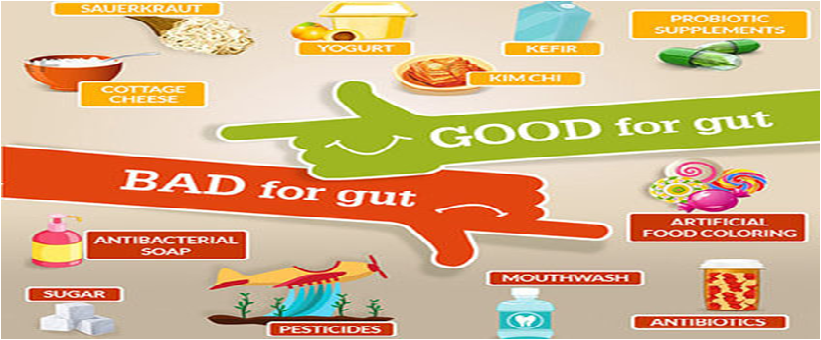Gut Bacteria and MOOD
Do gut bacteria really affect our mood?
Recent research has found that the bacteria residing inside our gut can manipulate our eating behavior and also play a major role in influencing our mood. So is it possible to manipulate the bacteria population inside the gut with food to stay positive and happy? In other words, can our eating behavior help us stave off depression?
It has been discovered that some bacteria interfere with the way that body regulates appetite.. This is because some healthy and normal gut bacteria, like E. coli, produce a specific enzyme called, ClpB (Caseinolytic peptidase B protein). CIpB is almost identical to the main satiety hormone, melanotropin, which works to regulate appetite. When antibodies attack the protein, they also attach onto the hormone, so the body doesn’t understand when it is satiated. This can lead to the eating disorders, namely, anorexia and bulimia. In anorexics, this process makes people feel satiated too early; in the case of bulimia, people tend to overeat, since they don’t feel full until it is too late.
Our body is a dwelling place for about trillions of bacteria and other microbes, collectively known as microbiome. They do many important things: break down food, fight off infection, and boost the immune system. However, scientists are finding that they may do even more than that, and have an important role in our mental health. Studies in both humans and animals indicate that the number and type of bacteria in the gut influence anxiety levels.
Mounting evidence indicates that manipulations of the microbiome affect both the brain and the body. In one study, volunteers who were taking certain kind of bacteria through food paid less attention to negative words, and more attention to positive ones, than those taking placebo. Probiotics have been shown to lower levels of cortisol, the stress hormone, which is linked with anxiety and depression. In other words it can be said that eating probiotics can alter behavior.
It is seen that stress and depression can lead to unhealthy eating behavior. So, what are the healthy alternatives, For example, instead of reaching out for potato chips or alcohol, you can have some healthy food alternative to bust stress.
It has been proven through research that prebiotic foods and probiotic foods reduce stress and depression. Red wine and dark chocolates, kimchi salad and sauerkraut are all healthy alternatives to potato chips and alcohol. Also the Indian curd and buttermilk are loaded with stress busting bacteria.
Some “happy and healthy” food suggestions to deal with short-term or daily stress are:
- Most fermented foods,
- Curd,
- Fresh fruits, fresh and cooked vegetables
- Pickles (made in foods own juices and not in oil) and
- Even red carrots “kanji:” which is a fermented drink.
These foods improve gut microflora, as they are probiotic and prebiotic foods. These help in reducing .anxiety and depression. Probiotics are good bacteria that are found in the gut and in certain foods, prebiotics are those foods that stimulate the growth or activity of, probiotics or the good bacteria, in the gut.
Prebiotics are typically non-digestible fiber compounds that pass undigested through the upper part of the gastrointestinal tract and stimulate the growth or activity of advantageous bacteria that colonize the large bowel by acting as substrate for them. Oats, banana, wheat bran, cabbage, most fruits especially those which can be eaten with the peel, are all examples of prebiotic foods
Foods whose consumption can increase the risk of bad mood or depression are:
- Processed and high fat foods
- Carbonated beverages and sodas
- Foods with too much sweet and fat and no fiber can cause bad moods as also too much of caffeine
- Heavy greasy meals with less or no fiber and high red meat content can also increase risk of bad mood.
Free Consultation with Top : Nutritionist Near Me

